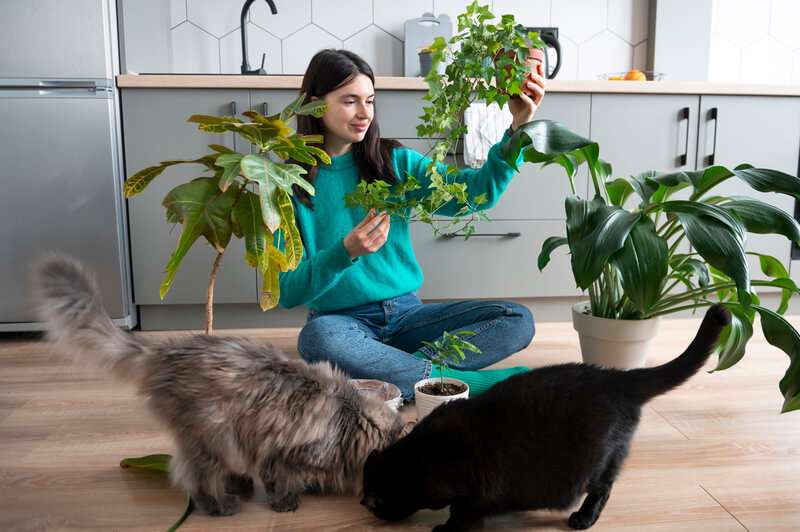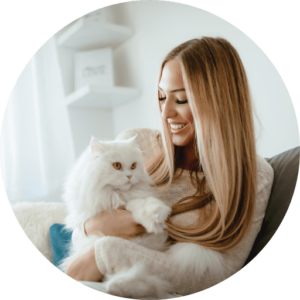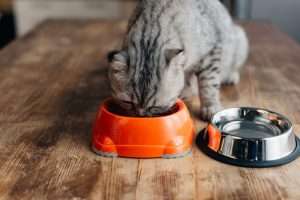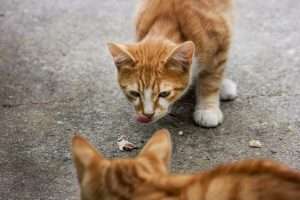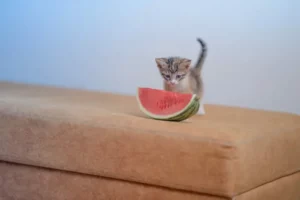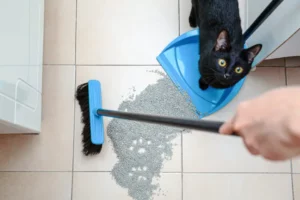Table of Contents
Can cats eat spinach? The short answer is yes. Spinach is acceptable for cats to consume. There are also commercial diets for cats available on the market that incorporate spinach as one of the ingredients in their meal.
So, it is not dangerous for cats to consume spinach. And also, there is no reason for them to include it in their diet because high-quality cat food should already have all they require to achieve their nutritional requirements.
Let’s talk about spinach and cats.
So, it is not dangerous for cats to consume spinach. And also, there is no reason for them to include it in their diet because high-quality cat food should already have all they require to achieve their nutritional requirements.
Let’s talk about spinach and cats.
You should now know the response, “Can cats eat spinach?”. It is important to keep in mind that cats do not require this leafy green vegetable as part of their diet. Hence, it does not need to be a permanent fixture, and spinach should never substitute for your cat’s primary source of nutrition
How to prepare spinach for feeding to cats?
It’s not too difficult to make a tasty snack out of spinach for your cat to eat whenever they want. We suggest merely steaming it and omitting any salt, spices, or seasonings, as these aren’t healthy for your feline companion, and you should avoid them in your cat’s diet. You can try feeding your cat a small bit of spinach that has been cooked and left plain to see if they enjoy it, but you shouldn’t be surprised if they turn their nose up at it! Most cats do not particularly enjoy eating veggies or fruits and would prefer to nibble on some yummy snacks explicitly designed for cats or a nice piece of meat instead.
As a special treat, you should only give your cat a small amount of spinach when it appears to be interested in eating it. It is essential to keep in mind the “10 percent rule” whenever you provide treats for your cat. This rule states that treats should not account for more than 10 % of your cat’s daily calorie intake, with the remaining 90 percent of your cat’s calories coming from complete and balanced cat food.
As a special treat, you should only give your cat a small amount of spinach when it appears to be interested in eating it. It is essential to keep in mind the “10 percent rule” whenever you provide treats for your cat. This rule states that treats should not account for more than 10 % of your cat’s daily calorie intake, with the remaining 90 percent of your cat’s calories coming from complete and balanced cat food.
Can Kittens Eat Spinach?
You do not need to be concerned if your baby cat has taken a little bit of a spinach leaf; nonetheless, it is recommended that young kittens not be given spinach. A newborn kitten’s internal organs are susceptible to infection because they are not yet fully developed. You really ought to consider it before offering them anything but the kitten food, much alone spinach. If you are giving your kitten spinach for the first time, you should take advice from your veterinarian first to make sure it is safe.

Spinach in its raw form - can cats eat it?
Raw spinach is another food you can give to the cats, but only in small amounts. If you give your cat raw spinach, it will maintain the highest possible concentration of all of its vitamin and mineral nutrients. As raw spinach contains high levels of oxalates, it is not recommended for cats with a history of urinary tract stones or atypical urine symptoms.
Can cats consume spinach that has been cooked?
If you need to add spinach to your cat’s diet, the safest and most effective way to do it is to first cook the spinach before offering it to your pet. The preparation method of the vegetable is also an essential component to consider. Either boiling or steaming the spinach is the method that will produce the most acceptable results for your cat. When cooked in this manner, the majority of the vital nutrients will be able to retain their integrity.
If you want to boil the food instead of frying it, be sure that you do not add any harmful ingredients such as pepper, salt, spices, or anything else that could compromise your cat’s health. The most effective method is to incorporate baby spinach leaves into your cat’s diet in very small amounts.
If you want to boil the food instead of frying it, be sure that you do not add any harmful ingredients such as pepper, salt, spices, or anything else that could compromise your cat’s health. The most effective method is to incorporate baby spinach leaves into your cat’s diet in very small amounts.
Is it healthy for cats to eat spinach?
The answer is yes; feline furballs may benefit from spinach in various ways. Because of this, many companies that make food for cats include minimal amounts of spinach in their recipes. The following are only some of the cats’ primary benefits of eating spinach.
Rich in vitamins and minerals
Even the smallest servings of spinach contain a significant amount of vitamin A, vitamin K, vitamin B6, vitamin B2, vitamin E, and vitamin C. Also, this dark leafy green contains magnesium, folate, calcium, and potassium, all of which are very important for the cat’s body.
Contains a considerable quantity of fiber
Compared to several other vegetables, spinach has a moderate amount of fiber. Nevertheless, it can still promote good digestive health, particularly for cats that struggle with constipation. Suppose your cat is only consuming a modest amount of spinach (the amount that is often found in commercial cat food). In that case, the vegetable consumption will not be sufficient to cause diarrhea, but it will aid in the digestion process as a whole.
It has a low-calorie count
Spinach has a lot of benefits, and one of those benefits is that it has very few calories. In addition to the high fiber content, this is another reason why including it in your pet’s food is beneficial for maintaining a healthy weight.
It contains omega-3 fatty acids
Spinach is not some magical low-calorie vegetable abundant in good fats, so please don’t get the wrong idea from what I’m saying. The noticeably low amount of omega-3s that it contains is not nearly as beneficial as fish or fish oil. But despite that, it’s a good thing to do.
So, there are a few benefits to providing spinach to your cat as a food source. Regrettably, they do not make it into a miracle supplement appropriate for each cat in the world.
So, there are a few benefits to providing spinach to your cat as a food source. Regrettably, they do not make it into a miracle supplement appropriate for each cat in the world.
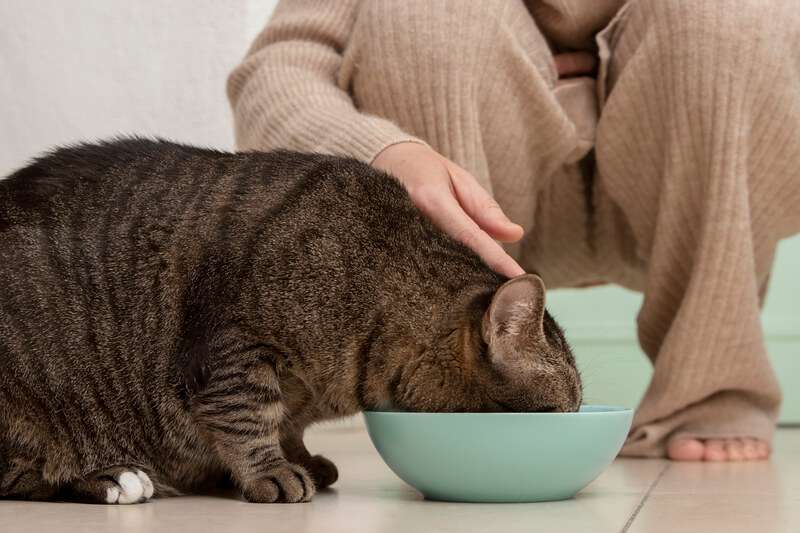
Is spinach harmful to cats to eat?
Spinach does not pose any health risks to cats and can be given to them as a treat or incorporated into their regular diet. However, as is the case with most things, moderation is the way to go. Your cat’s daily calorie intake, which includes her regular cat food and any treats or foods you give her in addition to that food, should not exceed 10 percent of the total calories in her diet. If you feed a higher proportion, this will throw off the diet’s balance, which may result in excesses or deficiencies in particular nutrients.
The average cat needs to consume approximately 200 calories every day, which indicates that they should get no more than 20 of their daily calories from treats and other supplemental foods. The good news is that spinach has a very low-calorie content; one raw spinach leaf only has about two calories. Because of this, it would not be easy to give a cat an excessive amount of spinach.
It is generally recommended that owners of cats who have a history of kidney stones, bladder stones, or any other record of abnormal urinary symptoms refrain from feeding their cats spinach. This is because feeding spinach may increase the risk of calcium oxalate stones developing in the urinary tract. On the other hand, the results of a single, more limited study showed that giving cats a diet high in oxalates did not cause an increase in the amount of these compounds that were excreted in their urine. Instead, it demonstrated that consuming high quantities of low-quality proteins led to a rise in urinary oxalate levels.
If you are unsure about whether or not you should feed your cat spinach or any other non-typical foods, it is best to consult with your veterinarian about the matter.
The average cat needs to consume approximately 200 calories every day, which indicates that they should get no more than 20 of their daily calories from treats and other supplemental foods. The good news is that spinach has a very low-calorie content; one raw spinach leaf only has about two calories. Because of this, it would not be easy to give a cat an excessive amount of spinach.
It is generally recommended that owners of cats who have a history of kidney stones, bladder stones, or any other record of abnormal urinary symptoms refrain from feeding their cats spinach. This is because feeding spinach may increase the risk of calcium oxalate stones developing in the urinary tract. On the other hand, the results of a single, more limited study showed that giving cats a diet high in oxalates did not cause an increase in the amount of these compounds that were excreted in their urine. Instead, it demonstrated that consuming high quantities of low-quality proteins led to a rise in urinary oxalate levels.
If you are unsure about whether or not you should feed your cat spinach or any other non-typical foods, it is best to consult with your veterinarian about the matter.
The Verdict
In conclusion, spinach is an exceptionally wholesome and nutrient-dense vegetable. Spinach has been shown to positively affect a cat’s health when given to an adult cat in good condition in little amounts. The product can also be used as a treat that contains plenty of nutrients but few calories.
It is best not to give cats with urinary troubles or any other medical concerns spinach unless you have first discussed the matter with your veterinarian.
If you cat likes eating green, you can all check if you can feed your cat Mango and Cucumber.
It is best not to give cats with urinary troubles or any other medical concerns spinach unless you have first discussed the matter with your veterinarian.
If you cat likes eating green, you can all check if you can feed your cat Mango and Cucumber.


